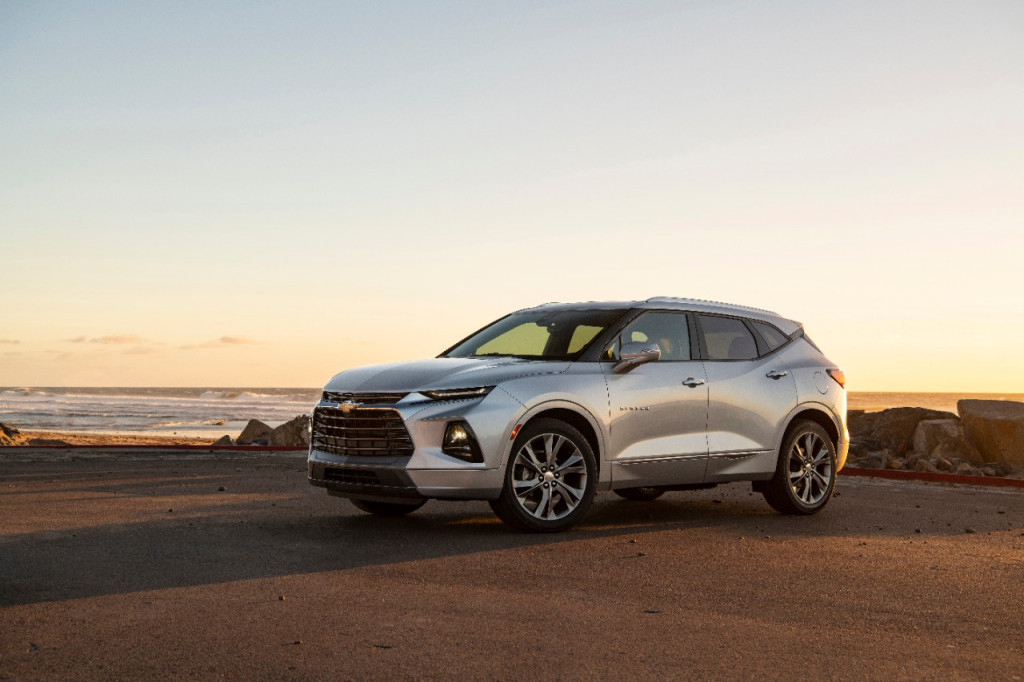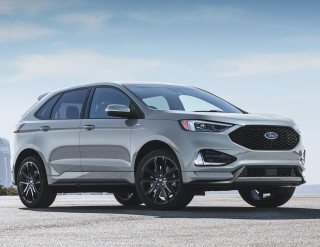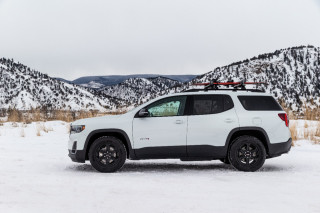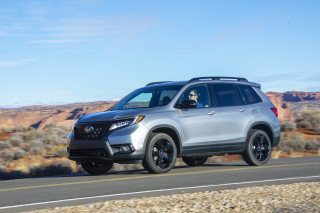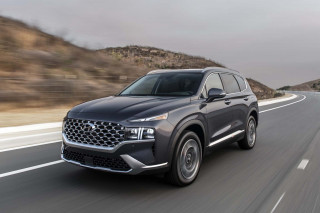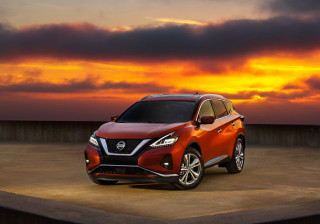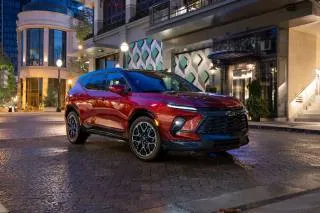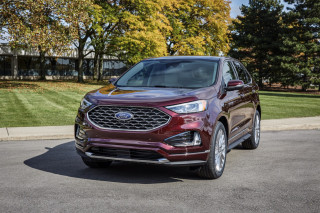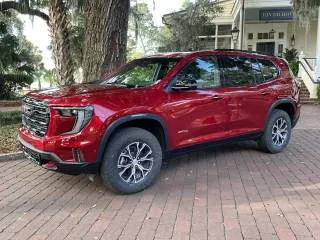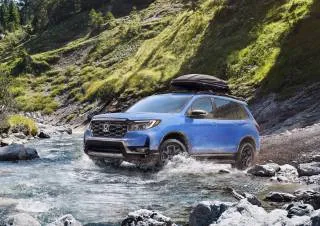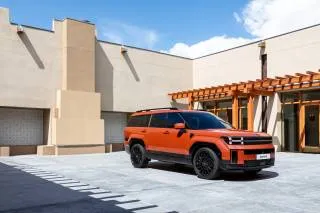Likes
- Clean break from Blazers past
- Admirable handling
- Towing capacity
- New turbo-4 engine
Dislikes
- Not much bigger than an Equinox
- Automatic emergency braking not standard
- Front seat comfort sags
Buying tip
features & specs
The 2021 Chevrolet Blazer leaves its truck roots behind, and cozies up to suburban crossover bona fides.
What kind of car is the 2021 Chevy Blazer? What does it compare to?
The 2021 Chevy Blazer is a five-seat crossover SUV that revives an old off-road nameplate. This one’s a family wagon, with a choice of front- or all-wheel drive and a choice between a trio of engines.
The Blazer’s big rivals include the Honda Passport, Ford Edge, Hyundai Santa Fe and Nissan Murano—and of course, the GMC Acadia.
Is the 2021 Chevy Blazer a good car?
It’s solid, but not a home run. Sold in base L, Blazer LT, RS, and Premier versions, we give the 2021 Blazer a 6.0 out of 10. (Read more about how we rate cars.)
What’s new for the 2021 Chevy Blazer?
This year Chevy makes automatic emergency braking standard on the 2LT Blazer and higher trims, but it’s still not standard on base L and LT editions.
This Blazer owes nothing to the vehicles that have worn the badge in the past. Chevy broomed those squared-off edges and implanted a swoopy look with a rising beltine and a roof that appears to float. It’s a popular theme so there’s nothing particularly edgy or daring here, but the Blazer wears it well enough. Inside the Blazer has a winglike dash with big vents and a big touchscreen, and in higher trims, leather upholstery.
Blazer performance begins with a base 193-horsepower inline-4 we’d bypass in favor of the newer 230-hp turbo-4. Coupled to the standard 9-speed automatic and front- or all-wheel drive, the turbo-4 Blazer strikes the best midpoint between performance and value. A 308-hp V-6 can be had—and it makes Chevy muscle-car noises–but it isn’t much quicker, though it does have a higher 4,500-pound tow rating. The Blazer handles well, and RS versions get a trick all-wheel-drive system that pivots power across the rear end for even crisper response.
Chevy fits the Blazer with a sliding second-row seat to play up its spacious interior, and skips the optional third-row bench of the similar GMC Acadia. But it fits the Blazer with narrow seats that aren’t shaped as well as they should be. Cargo space is strong, though not that much bigger than the next-smaller Equinox.
How much does the 2021 Chevy Blazer cost?
The Blazer gains standard automatic emergency braking this year on the 2LT trim and above, but it’s still missing from the base $31,000 Blazer L and the Blazer LT. Skip those and head right to the 2LT or the $38,000 3LT, which adds blind-spot monitors, leather upholstery, and heated front seats. All Blazers sport an 8.0-inch touchscreen with Apple CarPlay and Android Auto compatibility, and GM’s latest infotainment interface is fast and friendly—but give the $10-a-month cloud-based navigation a hard pass, and use your smartphone.
Where is the Chevy Blazer made?
In Spring Hill, Tennessee.
2021 Chevrolet Blazer Styling
The Blazer’s jaunty body and winglike dash stand out.
Is the Chevy Blazer a good-looking car?
We think it’s interesting, though the side profile has cues that are worn by a number of mid-size crossover SUVs. We give it a 7 in any case, with an extra point each for the exterior and interior.
That side view reveals a canopy-style roof that has blacked-out pillars that appear to make the roof float. It’s a well-worn visual trick, but one that works well with the Blazer’s chunky wheel housings and for its big grille and LED headlights. The visual wake-up call ends at the taillights, where the Camaro-like shapes are too small for the crossover.
Inside, the Blazer dons a wing-like dash that compromises some functions. A touchscreen takes up center stage, flanked by banks of buttons, and secondary controls sit wherever they can. The USB ports are above the smartphone storage bin, where they need to be, but the slim strip of climate controls that run across the center stack are too small to operate easily. The Blazer’s big round air vents use their trim rings to change temperature, but the vents themselves are poorly located and blow air into the driver’s eyes. Good-looking? Yes, but they’re less than helpful.
2021 Chevrolet Blazer Performance
The Blazer earns our nod in turbo-4 trim.
Chevy tunes the Blazer for a sportier ride and for sharper steering than many of its other crossovers. The raspy exhaust of the RS edition? That’s just a bonus, though we’re more inclined toward the mid-pack turbo-4 for value. We give the Blazer a 7 for performance, with bonus points for handling and for its two up-spec powertrains.
How fast is the Chevy Blazer?
Not very fast when it’s saddled with the base 193-hp 2.5-liter inline-4. The Blazer’s a chunky five-seater, and that’s just not enough power to motivate its 4,007 pounds even with a clever, well-sorted 9-speed automatic. It’s too slow, makes too much noise, and isn’t very fuel-efficient.
We’d select the quicker, nicer-sounding 230-hp 2.0-liter turbo-4 that joined the lineup last year. It’s offered with all-wheel drive and the same 9-speed. There’s considerably stronger pull from a stop with this engine, and though the automatic skips around more in search of the ideal gear, the quieter acceleration put this mid-range offering at the top of the shopping list.
At the top of the range, a burbly 308-hp 3.6-liter V-6 couples again with the 9-speed and front- or all-wheel drive. This Blazer’s brawn can tow with authority (up to 4,500 pounds), and it makes the best sounds of all the drivetrains offered in the mid-size crossover.
Is the Chevy Blazer 4WD?
All-wheel drive is offered on nearly every model, but 4-cylinder Blazers have a simpler setup which disconnects the rear wheels until the fronts spin, then engages them to shift half the power to the rear. V-6 Blazers have a more sophisticated twin-clutch rear differential which can move torque across the rear axle; that improves traction and improves handling.
All Blazers have a firm, assertively damped ride and relatively crisp steering, and at a minimum, 18-inch wheels. The Blazer’s independent suspension fidgets a bit over roughly textured pavement, but it keeps a straight line on the interstate. Chevy fits 20-inch wheels (or 21s, for a price) on the Blazer RS and Premier—and these versions ride better than base versions in spite of stiffer struts and shocks on the RS and a quicker steering ratio, too.
With available drive modes, the Blazer RS can be switched into a sport mode that moves power across the rear axle, and helps reduce the typical crossover dullness into a sweeter tune. The RS holds lower gears longer, the steering picks up more weight, and cuts corners in the best way possible.
2021 Chevrolet Blazer Comfort & Quality
The Blazer’s front passengers deserve better seats.
The Chevy Blazer lays out lots of space for its cargo, both human and otherwise. But its front seats are narrow and uncomfortable, which costs it points here. We give it a 6, with an extra point for its storage and utility.
Base Blazers have manual-adjusting seats in front, with cloth upholstery. With the LT, they’re upgraded with 8-way power adjustment and leather upholstery. On the top RS and Premier models the Blazer wears ritzy perforated leather. What it doesn’t have is the exceptional comfort found on some other $40,000 crossovers; the Volvo XC60 comes to mind. The Blazer’s chairs have very firm padding, and narrow and short seat bottoms, though the seat backs themselves offer plenty of support.
Chevy sells heated and cooled front seats and heated rear seats on some versions.
The second-row seat slides on a track to provide more of the Blazer’s already good leg room, and head room is no issue. Like the front seats, the Blazer’s back bench could use some more padding, though.
Behind those seats the Blazer has 30.5 cubic feet for cargo; fold them down, and the storage space expands to 64.2 cubic feet. That’s not much more than you’ll find in the slightly smaller Chevy Equinox, but high-end Blazers come off much better in fit and finish thanks to their active noise cancellation and upholstered dash.
2021 Chevrolet Blazer Safety
The 2021 Chevy Blazer performed well in crash tests, but lags the competition in safety features.
How safe is the Chevy Blazer?
It has good crash-test scores from the IIHS and the NHTSA to earn it a point, but the lack of standard automatic emergency braking costs it a point on our scale. It's a 5.
The feature becomes standard on the 2LT and above, in cahoots with blind-spot monitors and rear parking sensors. GM also offers a rear camera mirror on some models, while it makes its most advanced safety features available on the Blazer RS and Premier—including adaptive cruise control. We’d advise all of them, especially since the Blazer has relatively short side windows and thick roof pillars, all of which cuts into the view outside.
2021 Chevrolet Blazer Features
The Blazer’s infotainment game is strong, but it’s still missing some safety features.
Chevy equips the Blazer with a great infotainment system, and fills more expensive versions with lots of standard equipment—but it omits automatic emergency braking from base models. We give it a 7 for its value and its touchscreen infotainment system.
Base Blazer L crossovers cost about $30,000, and get standard power features, keyless start, 18-inch wheels with all-season tires, and an 8.0-inch touchscreen with Apple CarPlay and Android Auto compatibility. Automatic emergency braking isn’t available here, nor on the Blazer LT, which costs about $34,000 and adds in satellite radio hardware and a power driver seat.
Which Chevy Blazer should I buy?
We like the Blazer 2LT, which also costs about $34,000 and gets the turbo-4 standard, or the 3LT, which for about $38,000 adds blind-spot monitors, a power tailgate, a power front passenger seat, heated front seats and leather upholstery. Both of these can be fitted with the V-6—and both now come with automatic emergency braking, active lane control, and automatic high-beam headlights.
How much is a fully loaded Chevrolet Blazer?
The Blazer RS and Blazer Premier both cost more than $42,000. The Blazer RS sports navigation, a heated steering wheel, remote start, a power tailgate, and 20-inch wheels. Options include heated rear seats, cooled front seats, a rear camera mirror, a sunroof, and 21-inch wheels. Most drivers will prefer the more cushy Premier, with its heated rear seats, cooled front seats, power tilt/telescope steering and Bose audio.
Chevy offers options such as wireless smartphone charging and a surround-view camera system.
The Blazer’s 8.0-inch touchscreen interface is cleanly designed and works quite well, but we’d pass on the $10-a-month cloud-connected navigation. The average smartphone delivers the same directions at no extra cost.
2021 Chevrolet Blazer Fuel Economy
The mid-size 2020 Blazer earns mid-range gas mileage.
Is the Chevrolet Blazer good on gas?
We give the 2020 Blazer a fuel economy score of 4 based on its new turbo-4 engine, likely to be the most common of its three powerplants. Front-drive Blazers with the base inline-4 engine earn EPA ratings of 21 mpg city, 27 highway, 23 combined. With the new turbo-4, the Blazer gets 21/28/24 mpg with front-wheel drive, 21/27/23 mpg with all-wheel drive.
The EPA pegs the V-6 front-drive Blazer at 19/26/21 mpg, and at 18/25/21 mpg with all-wheel drive.
